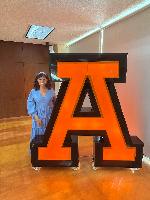Children's Rights Around the World
,
Colorado Convention Center, Bluebird Ballroom Lobby, Table 16
Presenters




Session description
Purpose & objective
Students will be Introduce to the United Nation Convention on the Rights of the Child (UNCRC). It is important to take into consideration what the students know about the topic. The students will be assigned a specific children's rights topic (e.g., education, healthcare, protection from violence). Explain the project's goals and expectations.
For the research and exploration, the students will use digital resources such as: websites, videos, or articles to identify examples from different countries where these rights are upheld or violated.
The students will be encouraged to communicate with peers from other schools (video conferencing) to gather information and diverse perspectives.
In class we will discuss the importance of responsible digital citizenship.
They will also learn about online safety, and respecting privacy.
Each group will create a digital presentation or multimedia project (e.g., videos, posters, infographics) that highlights their chosen children's rights issue, encouraging creativity and the use of technology tools (e.g., PowerPoint, Canva, iMovie) to enhance their presentations. As a global collaboration our classroom will connect with classrooms or organizations in other schools working on similar projects. We will arrange virtual meetings or collaborations to share findings and perspectives.
Each group will be encourage to present their video games to the class,the school community, parents, and local organizations.
Reflect on the project's outcomes, challenges, and lessons learned. At the beginning, middle and at the end of session. we will have a co-evaluation, self-evaluation and etero-evaluation to evaluate the whole process.. Discussing ways students can advocate for children's rights in their own communities.
The following project will be done in a period of two months, having sessions of 50 minutes long.
Outline
The content will be about Children´s rights and Responsabilities. They will investigate, research information in the website about the different children´s rights and responsabilities. The children will program a video game about the topic. the students will have a video call with other school to share their knowledge and investigations about the topic. The audience will participate at the end by playing the game.
Supporting research
https://glch.org.au/wp-content/uploads/2022/06/Childrens-Rights-and-Responsibilities.pdf
Session specifications
Laptop: Chromebook, Mac, PC
Tablet: Android, iOS, Windows
Empowered Learner
- Students understand the fundamental concepts of technology operations, demonstrate the ability to choose, use and troubleshoot current technologies and are able to transfer their knowledge to explore emerging technologies.
- Students engage in positive, safe, legal and ethical behavior when using technology, including social interactions online or when using networked devices.
- Students use collaborative technologies to work with others, including peers, experts or community members, to examine issues and problems from multiple viewpoints.
 Return
Return Participate and share: Poster
Participate and share: Poster  Trips and Tours
Trips and Tours